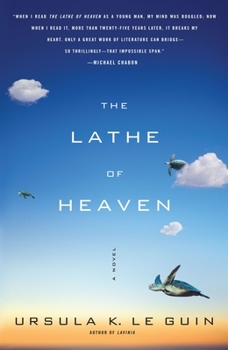The Lathe of Heaven
Select Format
Select Condition 
Book Overview
The Locus Award-winning science fiction novel by legendary author Ursula K. Le Guin, set in a world where one man's dreams rewrite the future. During a time racked by war and environmental catastrophe, George Orr discovers his dreams alter reality. George is compelled to receive treatment from Dr. William Haber, an ambitious sleep psychiatrist who quickly grasps the immense power George holds. After becoming adept at manipulating George's...
Format:Paperback
Language:English
ISBN:1416556966
ISBN13:9781416556961
Release Date:April 2008
Publisher:Scribner Book Company
Length:192 Pages
Weight:0.42 lbs.
Dimensions:0.6" x 5.9" x 8.9"
Customer Reviews
7 ratings
Sucked me in
Published by ShmoneyTrap , 1 year ago
A short read. Very exciting, ever changing, and quickly escalation apocalypse.
Good read
Published by chrism , 3 years ago
There were some slower areas, but I had a hard time putting it down. Unique storyline that keeps you wondering what happens next. Written well and easy to read.
Power without control, and morality in a man without judgement
Published by Thriftbooks.com User , 17 years ago
Warning - I talk about some minor plot points below. This is a novel whose premise is so outlandish that it begs for a dramatic opening line. Something that catapults the reader into the story and sets a frantic pace. A line like "Listen: Billy Pilgrim has come unstuck in time". Instead we get this: "Current-borne, wave-flung, tugged hugely by the whole might of ocean, the jellyfish drifts in the tidal abyss." With that opening, and throughout the book, Ursula K. Le Guin refuses to cater to readers who want the focus of the story to be fantastic power and unlimited possibilities. Instead she gives us a man, George Orr, who is relentlessly in balance. He is hard to upset, difficult to anger, but easy to coerce. And through some unknown power of the mind, his uncontrolled dreams change the very fabric of reality. When a well meaning psychiatrist discovers this power and begins to use it to improve the lot of the human race, Orr must struggle to decide how much change is too much. Although he is curiously without judgment in most things, he feels deeply that the integrity of what is should be respected. Nonetheless, he is such a passive man that he bends to the will of his doctor almost until it is too late. Because Orr believes so deeply in reality and in humans being what we are, his subconscious cannot help but balance each improvement in humanity with a correspondingly harsh but in hindsight perfectly logical setback. When asked to imagine perfect peace on Earth, his subconscious assumes that there is something else to fight against, in this case aliens. When asked to imagine a world without racial strife, he does not imagine good will breaking out across the planet, but a human race where everyone looks the same. These setbacks infuriate the doctor who uses Orr. But it may be that Orr is only capable of one leap of imagination, the original one that he made to dream that the human race might not destroy itself. Almost unnoticed towards the end of the novel, Orr remembers our original reality, the world that held before he began to dream new ones. And in that reality humankind had befouled the planet and dealt it a death blow with war. So even though he is unable to imagine the paradises wished for by his doctor, Orr still finds himself imagining that the whole world is a dream simply because it still exists. This is a powerful and thought provoking book, and a quick read to boot. I imagine that different readers could draw different lessons from it, but for me the thing that stood out the most was the desire of the doctor to do good with the power he had found, despite the evilness of his outcomes. It was a potent reminder that those who do the greatest harm are often seeking to do the greatest good.
An entry course to Taoism
Published by Thriftbooks.com User , 22 years ago
As a person who learned a little Taoism growing up, I find the book a stunningly authentic and spot-on Taoist-themed story told in the sci-fi format. This story about a passive, ordinary, unheroic, most unlikely hero who is able to dream up reality and an aggressive, progress-minded, megalomanical psychologist who creates disasters for the world by trying to manipulate and control the former's dreams, is more poignant and relevant now than ever. Many accomplishments make this book an exceptional work, including the well-rounded and complex characters, the emotionally rich story, the fluid style, the clever premise. The most astounding success, however, is her precise understanding of the Taoist philosphy and then infusing it in a profoundly human story. After all, Taoism is an observation of the human condition. I have never seen it better illustrated in another story. Le Guin refrained from making the antagoist into a typical bad guy, a mad scientist out to destroy the world. His blindness to his own evil echos Graham Greene's "The Quiet American." The road to hell is paved with good intentions. The novel criticizes not science, but the arrogance of the Western culture, as the hand that leads the world to hell. It must be read as a fable, a reflection of what is really going on in the world, now, every day.
how'd i miss that ?
Published by Thriftbooks.com User , 24 years ago
In the year 2002, Earth is plagued by war, famine, pollution, overpopulation, etc. George Orr is afraid to go to sleep, because when he wakes, whatever he dreamt the night before has become reality. He is put in a Voluntary Therapeutic Treatment program when he is caught using drugs to avoid sleep. There he meets Dr. Haber, who sees in George a solution to the world's problems and so he starts manipulating George's dreams to create a "better" reality. Haber's delusion's of godhood inevitably lead to unintended consequences & it's up to George, the freak of nature, to stop him. Ursula K. LeGuin is one of the towering figures in Science Fiction, indeed in all of literature, and this is her finest novel; a brilliant cautionary tale to rival Mary Shelley's Frankenstein. GRADE: A POSTSCRIPT: I don't know how I missed this angle, unless I'm losing something off of what little fastball I once had, but I just watched the long lost PBS version of this story and the most important aspect of this story became abundantly clear. After they showed the movie, Bill Moyers interviewed the author and it occurred to me that this may well be one of the most conservative novels ever written. Though she spoke of the story in Taoist terms--George Orr gets along by going along--it is also easy to read the plot in political terms. Dr. Haber can be seen as any intellectual who conceives a better way for society and then seeks to impose it, completely failing to understand the unintended consequences which this action will inevitably have. George Orr, meanwhile, understands that the power to shape reality is too dangerous to entrust to any one man or group of men. It is better to let the future evolve naturally and preserve Man's free will, even if this means not stepping in to "fix" some situations that seem amenable to his personal solutions. This is sort of the novelization of Friedrich Hayek's Road to Serfdom and it is very, very good.
A wonderful book about a sensitive man in a world gone mad!
Published by Thriftbooks.com User , 25 years ago
This my favourite book! (and I am not a science fiction fan) I read it in grade eight and now I usually read it every five years so that I never forget its beauty. Many readers like the science fiction aspects but I think what is the real beauty of the novel is to be found in the wonderful relationship that develops between the sensitive main character, George Orr, and the super type A personality lawyer, Miss Lelache. I find the novel to be timeless and not a "70's novel." And if anyone knows the meaning of the alien's term "iahklu" which they associate with George Orr then please e-mail me and advise.
Dream a little dream...it may come true.
Published by Thriftbooks.com User , 27 years ago
It is a bit more than a quarter of a century since Ursula K. Le Guin's classic novel of the near future was originally penned; a classic science fiction tale that is quite simply, a masterpiece. Avon Books has re-issued a new trade paperback format of the book, bringing this imaginative fable of power--both uncontrolled and uncontrollable--to a whole new generation of readers. And if you happened to see the WNET movie adaptation done in 1980, please read (or re-read) the book; as with most book to movie translations, the movie was good--but the book is just so much better! THE LATHE OF HEAVEN is the story of George Orr--a man whose dreams become reality, for better or worse. Against his will, Orr is incarcerated, then sent for psychiatric care to treat his "delusions". After a few experimental sessions, Dr. Haber, Orr's psychiatrist, realizes what is going on and decides to start tinkering with the real world...to make it better--with devastating ramifications. Like Philip K. Dick at his best, Le Guin truly gets the reader into the inner machinations of the protagonist's head--while taking sly social sideswipes at such matters as geopolitics, race, socialized medicine, and the patient/shrink relationship. And there is a reason that Le Guin has often been referred to as a "writer's writer". Her prose is artfully wrought with vivid imagery in an inimitable style which conveys more in a few sentences than others tell in pages. It is an allegorical tale in which a "miracle worker" (George Orr) comes under the control of someone wanting to play "master of the universe" (Dr. Haber). It is a dark vision and a warning--a fable of power both uncontrolled and uncontrollable--a truly prescient and startling view of humanity, and the consequences of God-playing. As usual, a brilliant novel from Le Guin, who explores many profound possibilities within the tight story; it is quite simply, a masterpiece. There have been so many works analyzing Ursula K. Le Guin's works since she vaulted to the vanguard of science fiction since the publication of her first novel in 1966--but the best way to know her work is by reading it. And if you have only read her Hainish or Earthsea novels, you are in for a pleasant change of venue
The Lathe of Heaven Mentions in Our Blog

The Perfect Bookish Quotes for Gift Tags or Holiday Cards
Published by Ashly Moore Sheldon • December 20, 2022
Are you fretting over what to write on gift tags or in your holiday greeting cards? Here's the perfect solution! We've curated a collection of wise, witty, and "aww"-inspiring literary quotes for all the special people in your life.






